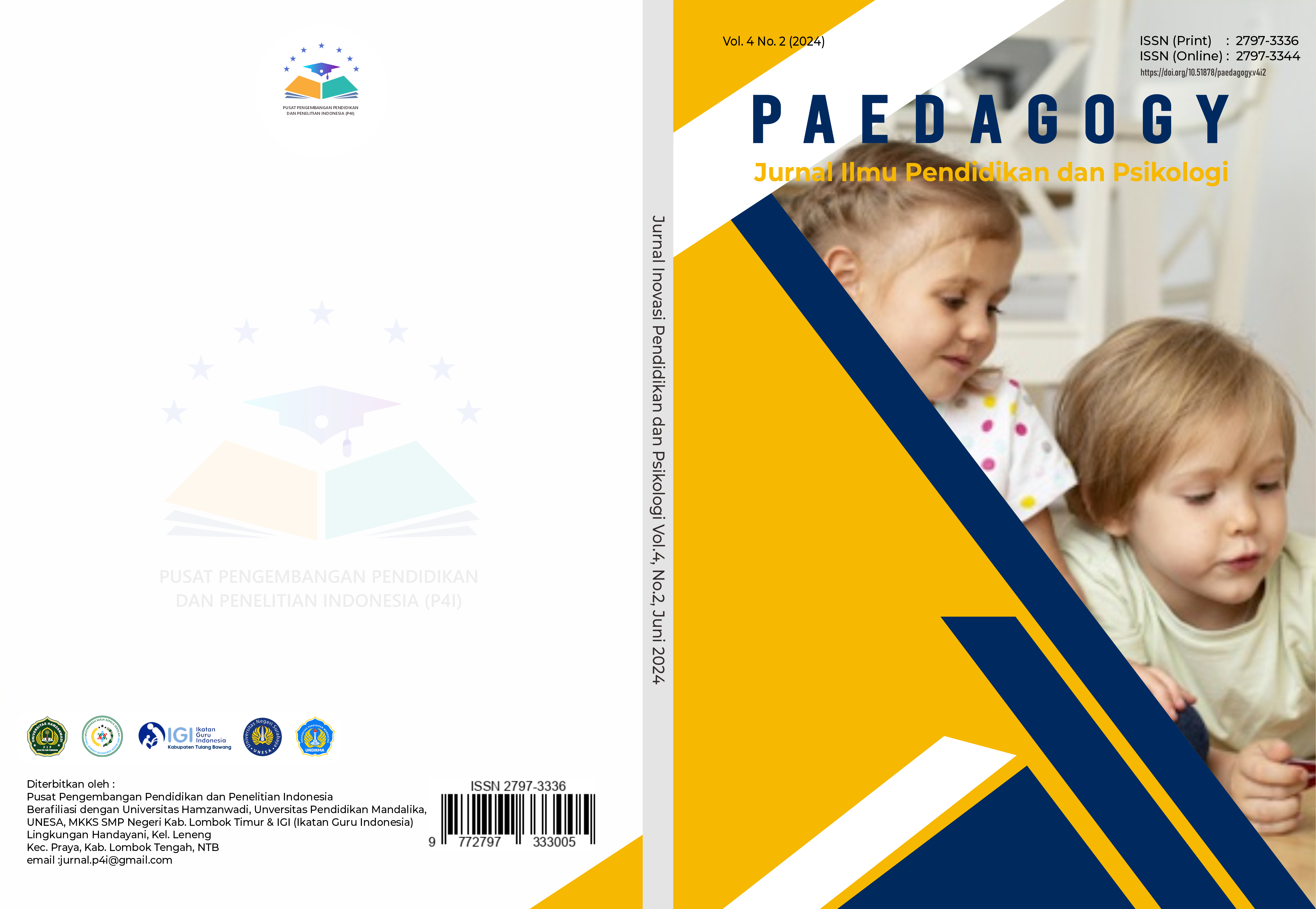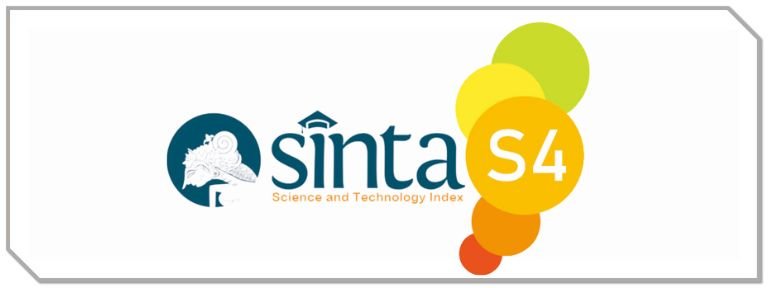HUBUNGAN ANTARA SELF CONTROL DENGAN FEAR OF MISSING OUT (FOMO) PADA GENERASI Z PENGGUNA MEDIA SOSIAL TIKTOK
DOI:
https://doi.org/10.51878/paedagogy.v4i2.3077Keywords:
Kontrol diri, takut tertinggal, generasi zAbstract
The rise of TikTok in Indonesia can have several negative impacts on Generation Z, for example, a strong desire to continue following activities carried out by other users on TikTok social media. This causes fear, worry and anxiety when we miss out on various information and trends on TikTok, which is called the fear of missing out. The aim of this research is to determine the relationship between self-control and fear of missing out in Generation Z users of TikTok social media. The method in this research uses quantitative methods. The population is unknown with criteria, namely all TikTok social media users aged 12-24 years, therefore this research uses G*Power 3.1.9.7. to determine the number of samples to be used. The sample used in this research was 160 respondents. The results of the Pearson product moment correlation analysis show that the correlation value = -0.433 and p is 0.000. This shows that there is a negative relationship between self-control and fear of missing out. This means that the higher the self-control, the lower the fear of missing out. Likewise, the lower the self-control, the lower the fear of missing out.
ABSTRAK
Maraknya TikTok di Indonesia dapat menimbulkan beberapa dampak negatif bagi generasi z misal, adanya keinginan kuat untuk terus mengikuti kegiatan yang dilakukan oleh pengguna lain di media sosial TikTok. Hal ini menimbulkan ketakutan, kekhawatiran, dan kecemasan ketika tertinggal berbagai informasi dan trend yang ada di TikTok yang disebut dengan fear of missing out. Tujuan dari penelitian ini untuk mengetahui hubungan antara self control dengan fear of missing out pada generasi z pengguna media sosial TikTok. Metode pada penelitian ini menggunakan metode kuantitatif. Populasi tidak diketahui dengan kriteria yaitu seluruh pengguna media sosial TikTok yang berusia 12-24 tahun, maka dari itu penelitian ini menggunakan G*Power 3.1.9.7. untuk mengetahui jumlah sampel yang akan digunakan. Sampel yang digunakan dalam penelitian ini berjumlah 160 responden. Hasil dari analisis korelasi product moment pearson diperoleh bahwa nilai korelasi = -0,433 dan p sebesar 0,000. Hal ini menunjukkan terdapat hubungan yang negatif antara self control dengan fear of missing out. Artinya bahwa semakin tinggi self control semakin rendah fear of missing out. Begitupun sebaliknya semakin rendah self control maka semakin rendah pula fear of missing out.
Downloads
References
Abel, J. P., Buff, C. L., & Burr, S. A. (2016). Social media and the fear of missing out: scale development and assessment. Journal of Business & Economics Research (JBER), 14(1), 33-44.
Aisafitri, L., & Yusriyah, K. (2021). Kecanduan media sosial (fomo) pada generasi milenial. Jurnal Audience: Jurnal Ilmu Komunikasi, 4 (1), 86-106. https://doi.org/10.33633/ja.v4i01.4249
Akbar, R. S., Aulya, A., Psari, A. A., & Sofia, L. (2019). Ketakutan akan kehilangan momen (FoMO) pada remaja kota Samarinda. Psikostudia J. Psikologi, 7(2), 38. http://dx.doi.org/10.30872/psikostudia.v7i2.2404
Aprilia, N. (2020). Pengaruh kesepian dan kontrol diri terhadap kecenderungan ketergantungan terhadap ponsel. Psikoborneo: Jurnal Ilmiah Psikologi, 8(2), 294-254. http://dx.doi.org/10.30872/psikoborneo.v8i2.4908
Apriliawati, Denisa. Menghitung ukuran sampel dengan g*power: korelasi bivariat (pearson product moment). youtube, 29 September 2022, https://www.youtube.com/watch?v=4YjENH9BQcU
Aresti, N. G., Lukmantoro, T., & Ulfa, N. S. (2023). Pengaruh tingkat fear of missing out (fomo) dan tingkat pengawasan orang tua terhadap tingkat kecanduan penggunaan tiktok pada remaja. Interaksi Online, 11(3), 272-284.
Arum, D., & Khoirunnisa, R. N. (2021). Hubungan antara kontrol diri dengan perilaku konsumtif pada mahasiswi psikologi pengguna e-commerce shopee. Character: Jurnal Penelitian Psikologi, 8(9), 92-102.
Azwar, S. (2009). Efek seleksi aitem berdasar daya diskriminasi terhadap reliabilitas skor tes. Buletin Psikologi, 17(1).
Azwar, S. (2018). Metode penelitian psikologi edisi II.
Baumeister, R. F., Vohs, K. D., Aaker, J. L., & Garbinsky, E. N. (2016). Some key differences between a happy life and a meaningful life. In Positive Psychology in Search for Meaning (pp. 49-60). Routledge.
Bloemen, N., & De Coninck, D. (2020). Social media and fear of missing out in adolescents: The role of family characteristics. Social MediaSociety, 6(4). https://doi.org/10.1177/2056305120965517
Charan, J., & Kantharia, N. (2013). How to calculate sample size in animal studies?. Journal of Pharmacology and Pharmacotherapeutics, 4(4), 303-306.
Darmayanti, D. P., Arifin, I., & Inayah, M. (2023). FoMO: kecemasan digital di kalangan pengguna tiktok. emik, 6(2), 198-215. https://doi.org/10.46918/emik.v6i2.2041
Deriyanto, D., & Qorib, F. (2019). Persepsi mahasiswa universitas tribhuwana tunggadewi malang terhadap penggunaan aplikasi tik tok. Jurnal Ilmu Sosial dan Ilmu Politik (JISIP), 7(2).
Ghufron, M. N., & Suminta, R. R. (2010). Teori-teori psikologi.
Jannah, M. (2016). Psikologi eksperimen: sebuah pengantar. Surabaya: Unesa University Press.
Jannah, M. (2018). Metodologi penelitian kuantitatif untuk psikologi. surabaya: Unesa University Press.
Kadri, A. F. (2022). Hubungan antara kontrol diri dengan fear of missing out pada mahasiswa pengguna media sosial di universitas islam riau. Doctoral dissertation, Universitas Islam Riau.
Kaontole, I. T., Rumayar, A. L., & Kumaat, M. M. (2023). Analisis Karakteristik dan Tingkat Pelayanan Arus Pejalan Kaki (Studi Kasus: Jl. Suprapto–Jl. Lembong). TEKNO, 21(84), 627-638.
Kusumaisna, K. (2023). Hubungan antara Intensitas Penggunaan Media Sosial dengan Fear of Missing Out (FoMO) pada Dewasa Awal Pengguna Aktif Media Sosial Kota Surabaya. Jurnal Penelitian Psikologi, 10(2), 749-764.
Lakens, D. (2013). Calculating and reporting effect sizes to facilitate cumulative science: a practical primer for t-tests and ANOVAs. Frontiers in psychology, 4, 62627.
Lenth, Russell V (2001). Some practical guidelines for effective sample size determination. The American Statistician, 55(3), 187–193. doi:10.1198/000313001317098149
Maza, S., & Aprianty, R. A. (2022). Hubungan kontrol diri dengan fear of missing out (fomo) pada remaja pengguna media sosial. Jurnal Mahasiswa BK An-Nur: Berbeda, Bermakna, Mulia, 8(3), 148-157.
Mile, A. C., Firmawati, F., & Febriyona, R. (2023). Hubungan kontrol diri dengan kecanduan media sosial (tiktok) pada remaja di smpn 4 tilamuta. Jurnal Rumpun Ilmu Kesehatan, 3(1), 198-207.
Mochali, I. (2016). Metode penelitian kuantitatif.
Mutib, A. (2023). Hubungan intensitas penggunaan media sosial Tiktok dengan fenomena fear of missing out FOMO pada remaja awal Doctoral dissertation, Universitas Islam Negeri Maulana Malik Ibrahim.
N?cka, E. (2015). Self-control scale AS-36: construction and validation study. Polish Psychological Bulletin, (3).
Nurhanifa, A., Widianti, E., & Yamin, A. (2020). Kontrol diri dalam penggunaan media sosial pada remaja. Jurnal Ilmu Keperawatan Jiwa, 3(4), 527-540.
Pramesti, Getut. 2017. Statistika penelitian dengan SPSS 24. Jakarta: PT. Elex Media Komputindo, Gramedia Group.
Pratama, A. A. P., Narti, S., & Yanto, Y. (2023). Analisis perilaku komunikasi pengguna media sosial tik tok. Professional: Jurnal Komunikasi dan Administrasi Publik, 10(2), 775-786.
Przybylski, A. K., Murayama, K., DeHaan, C. R., & Gladwell, V. (2013). Motivational, emotional, and behavioral correlates of fear of missing out. Computers in human behavior, 29(4), 1841-1848.
Puspitadesi, D. I., Yuliadi, I., & Nugroho, A. A. (2013). Hubungan antara figur kelekatan orangtua dan kontrol diri dengan perilaku seksual remaja sma negeri 11 yogyakarta. Jurnal Ilmiah Psikologi Candrajiwa, 1(4).
Rahmah, P., Putri, M., & Utami, A. S. (2023). Hubungan antara kontrol diri dengan kecanduan media sosial pada remaja. Jurnal Keperawatan Jiwa, 11(4), 859-866.
Rani, P., Tyagi, R., Kathpalia, J., & Kumari, V. (2023). Impact of social media on the health of the rural youth: a sociological study. IAHRW International Journal of Social Sciences Review, 11(2).
Rani, P. (2021). Social media addiction: impact on life. international journal of research publication and reviews, 3(2). diambil dari https://paradigmtreatment.com/anxiety-teens-young-adults/social-media-addiction/
Rasyida, N. A. (2021). Hubungan antara self control dan fear of missing out dengan kecanduan internet pada penggemar korean pop. Doctoral dissertation, Universitas Islam Negeri Maulana Malik Ibrahim Malang.
Rucita, N., & Rahmasari, D. (2022). Hubungan antara kesepian dan kontrol diri terhadap remaja yang mengalami smartphone addict. Jurnal Penelitian Psikologi, 16(03).
Servidio, R. (2021). Self-control and problematic smartphone use among Italian University students: The mediating role of the fear of missing out and of smartphone use patterns. Current Psychology, 40(8), 4101-4111.
Sette, C. P., Lima, N. R., Queluz, F. N., Ferrari, B. L., & Hauck, N. (2019). The online fear of missing out inventory (ON-FoMO): Development and validation of a new tool. Journal of Technology in Behavioral Science, 5, 20-29.
Solikha, I. (2022). Hubungan antara intensitas penggunaan media sosial dengan fear of missing out (fomo) pada siswa smp nx. Doctoral dissertation, Universitas Islam Sultan Agung.
Sujarwo, S., & Rosada, M. M. (2023). Hubungan kontrol diri dengan fear of missing out pada pengguna media sosial. Jurnal Psikologi: Jurnal Ilmiah Fakultas Psikologi Universitas Yudharta Pasuruan, 10(1), 178-189
Tangney, J. P., Baumeister, R. F., & Boone, A. L. (2004). High self-control predicts good adjustment, less pathology, better grades, and interpersonal success. Journal of Personality, 72, 271-324. doi:10.1111/j.0022-3506.2004.00263.x .
Wahyunindya, B. P., & Silaen, S. M. J. (2021). Kontrol diri dengan fear of missing out terhadap kecanduan media sosial pada remaja karang taruna Bekasi Utara. Ikra-Ith Humaniora: Jurnal Sosial dan Humaniora, 5(1), 1-8.
We Are Social. (2024). digital 2024: 5 billion social media user. online at https://wearesocial.com/id/blog/2024/01/digital-2024-5-billion-social-media-users/, Accessed 31 Januari 2024.
Wibaningrum, G., & Aurellya, C. D. (2020). Fear of missing out scale Indonesian version: An internal structure analysis. Jurnal Pengukuran Psikologi Dan Pendidikan Indonesia.
Wijaya, P. M. N., Suandita, I. K. E., Della Maharani, N. M., & Parwita, G. B. S. (2022). Perilaku generasi z terhadap penggunaan media sosial tiktok: tiktok Sebagai Media Edukasi dan Aktivitas. Prosiding Pekan Ilmiah Pelajar (PILAR), 2, 415-424.
Yanuartuti, S. (2023). Karya tari “fomo on tiktok” sebagai ungkapan takut tertinggal trend tiktok dalam bentuk tipe dramatik. Solah, 1(1), 39-50.
Yaputri, M. S., Dimyati, D., & Herdiansyah, H. (2020). The correlation between fear of missing out (fomo) phenomenon and consumptive behaviour in millennials. Doctoral dissertation, President University. https://doi.org/10.53276/eligible.v1i2.24
Zuhroh, S. F., & Setiawan, A. (2022). Pengaruh self-control terhadap tiktok addiction. Afeksi: Jurnal Psikologi, 1(1), 253-263.
Huysman, M. (2000). An organizational learning approach to the learning organization. European Journal of Work and Organizational Psychology. 9(2). 133-145.
Downloads
Published
How to Cite
Issue
Section
License
Copyright (c) 2024 PAEDAGOGY : Jurnal Ilmu Pendidikan dan Psikologi

This work is licensed under a Creative Commons Attribution-NonCommercial-ShareAlike 4.0 International License.
















